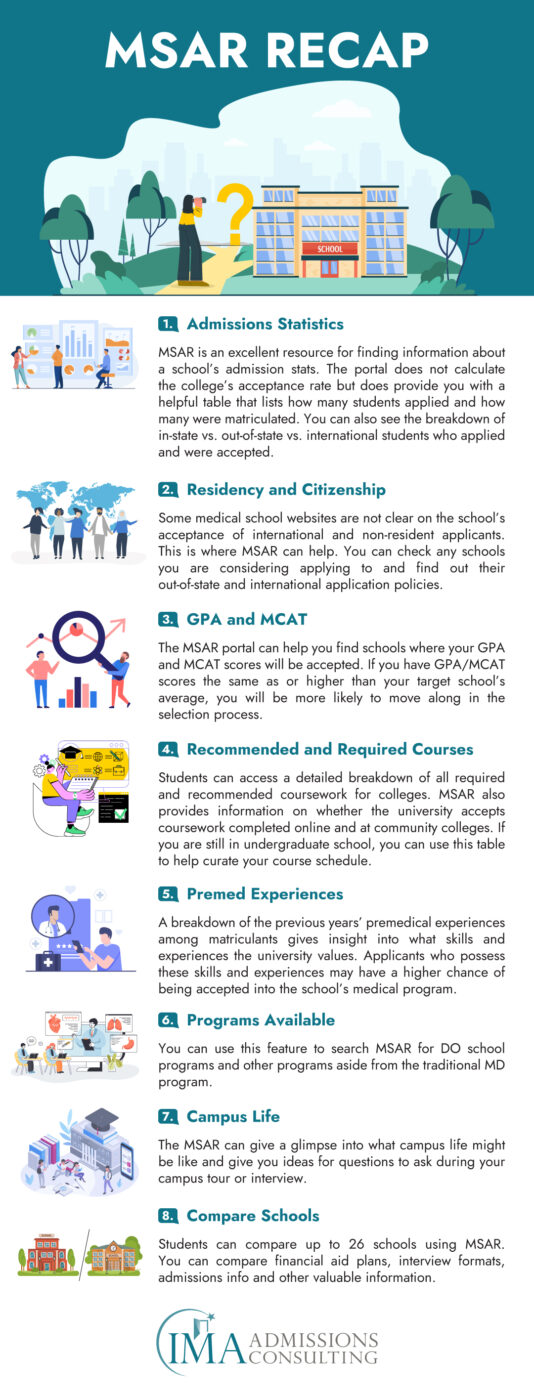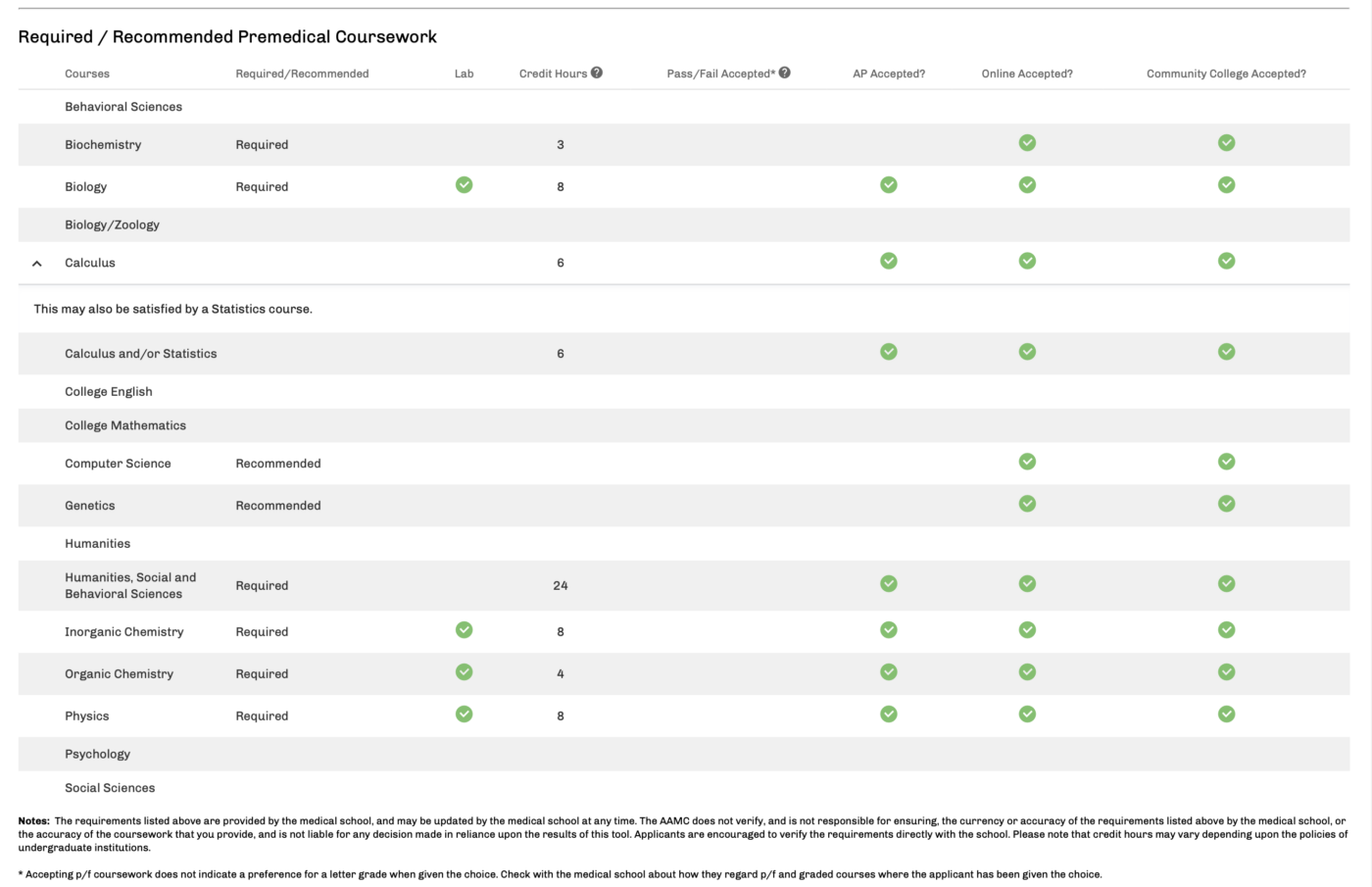What is MSAR?
The MSAR, also known as the AAMC Medical School Admission Requirements, is a database that provides information about all MD programs in the United States. For those who are looking to apply to DO vs. MD programs, take a look at the AACOM Choose DO portal to research which osteopathic program is right for you.
MSAR is a useful tool if you are searching for the best MD program for you. It provides a wealth of information, such as admissions information, med school prerequisites, med school recommendation letter requirements, outlines medical school secondary application essay expectations and school interview processes.
Understanding how to use the MSAR database can help you select the best medical school and increase your chances of being accepted into your target school. Here are some key MSAR elements that you can utilize during your search.
If you feel you may need additional assistance with your medical school application, consider utilizing medical school admissions consulting services.
Cost of the MSAR
The AAMC MSAR has two cost options:
- Free – The free version of the MSAR database provides you with basic information such as application deadlines, course details, tuition details, and a few details about each college.
- Paid – The paid version of the MSAR database provides you with a complete profile of a university’s admission requirements and expectations. This includes the median GPA and MCAT scores of the college’s matriculants. The one-year subscription costs $28, and the two-year subscription is $36.
We highly recommend purchasing the paid version of MSAR as it provides more information that will help you choose the best med school. Students who are part of the AAMC fee assistance program have access to the MSAR at no cost during the year that they are part of the program.
How to Register for MSAR
Before registering for MSAR, you will need to register an AAMC account. To register for an AAMC account, you will need to provide your personal information, answer a few questions regarding your background (undergrad, medical school, etc.) and add your new account details. After completing this form, AAMC sends a confirmation email to complete the process.
You can then access the MSAR portal using your AAMC information. The free version of the database is available to everyone, but in order to access the paid version, you will need to use your AAMC credentials to purchase either the one or two-year subscription. This can be done using the AAMC store.
When is MSAR Data Updated?
The data in the MSAR portal is updated on an annual basis. This yearly update usually occurs in April. AAMC occasionally updates the MSAR portal throughout the year with minor changes to ensure all information is up to date.
MSAR Feature: Admissions Statistics
Perhaps the most common question asked by students is, “What is this school’s admissions rate?” Some universities have higher acceptance rates than others, and some schools have quite low acceptances (around 1%). Knowing the acceptance rates of the medical schools you are applying to gives you an idea of how competitive your application needs to be.
MSAR is a great resource for finding information about admissions rates and statistics. The portal does not give you the admission rate (percentage), but it does provide you with the number of students who applied and the number of students who matriculated, allowing you to calculate the admission rate. You can also see how many in-state vs. out-of-state vs. international students applied and were accepted into the program. The admission rate can be calculated by dividing the number of students accepted by the total number of students who applied to the college, then multiplying it by 100%. As an example, check out the admissions information for Johns Hopkins Medical School:
| Categories | In-State | Out-of-State | International | Total |
|---|---|---|---|---|
| Verified Applicants | 446 | 6112 | 487 | 7045 |
| Interviewed | 40 | 543 | 20 | 603 |
| Deferred | 1 | 5 | 0 | 6 |
| Early Assurance Program | 0 | 0 | 0 | 0 |
| Early Decision Program | 0 | 0 | 0 | 0 |
| Baccalaureate/MD | 0 | 0 | 0 | 0 |
| MD/PhD | 2 | 10 | 0 | 12 |
| Matriculated | 10 | 108 | 2 | 120 |
Using the data above, we can calculate the acceptance rate for Johns Hopkins Medical School. Overall the acceptance rate is 1.7%, an in-state success rate of 2.2%, an out-of-state success rate of 1.8%, and an international success rate of 0.4%.
MSAR Feature: Residency and Citizenship
It is important for out-of-state applicants to know if the school they are applying to accepts non-residents. There are many colleges in the United States that are out-of-state friendly. However, there are some colleges that do not accept non-resident applicants. The MSAR portal gives you a detailed breakdown of whether a college accepts non-resident applicants if they review out-of-state applications on a case-by-case basis or if residency plays no role in your chances of being accepted.
Most private medical schools do not care if an applicant is an in-state applicant or an out-of-state applicant, meaning out-of-state applicants have a higher chance of being accepted by a private medical school. Why is this? Public medical schools are subsidized by the state government, which often limits how many out-of-state applicants the college can accept. On the other hand, private universities do not rely on state funding, so they are free to accept students of any residency or citizenship status. Keep in mind that public schools are some of the cheapest medical schools to attend for applicants who are in the state. This is because they are subsidized, and they want to attract local applicants to practice medicine in their home state.
Not all medical school websites are clear about whether they accept non-resident applicants. The MSAR database comes in handy for finding this information when it’s not readily available on a school’s website. If you are an applicant from Canada, the MSAR portal can provide you with information about Canadian Friendly medical schools in the United States. We also encourage international applicants to check which medical schools accept non-citizens before applying to an MD program. To give you a better understanding of why this is important, let’s take a look at the residency requirements for Johns Hopkins Medical School.
| Applications Accepted From | Policy | Additional Information |
|---|---|---|
| Out-of-state Applicants | Yes | Yes: All applicants |
| Canadian Applicants | Yes | Yes: All applicants |
| International Applicants | Yes | Yes: Must meet requirements on website |
| DACA Status Applicants | Yes | Yes: All applicants |
As you can see from the above table, Johns Hopkins does not give preference to either in-state or out-of-state applicants, and they accept international applicants. If you are an international applicant and hoping to apply to Johns Hopkins, it is crucial to check the college’s website to ensure you meet all the requirements for international applicants prior to applying.
MSAR Feature: GPA and MCAT Scores
Your GPA and MCAT scores are usually the first two indicators that medical school admissions committees look at when they receive your application. More competitive schools, such as Ivy League schools, use these stats to weed out applicants who do not meet the school’s GPA or MCAT score requirements. Due to the large volume of applications these colleges receive each year, the committee tries to reduce their workload as much as possible, hence weeding out applicants early in the review process. After weeding out the applications with lower MCAT and GPA scores, they can dedicate their time to reviewing the remaining applications. This process is used by the majority of medical schools, not just those that are viewed as top-tier universities. Students should apply to schools whose GPA and MCAT averages are in line with the student’s scores for higher chances of acceptance.
What is an easy way to prevent yourself from being cut early in the application review process? Check MSAR to learn more about the school’s academic requirements before applying. You should apply to schools where the average GPA and MCAT scores are less or equal to your scores. We encourage students not to apply to colleges where the average MCAT and GPA scores are higher than their scores.
While you may have a strong medical school personal statement and impressive entries in the AMCAS Work and Activities portion of your application, if the university cuts you based on your MCAT and GPA, the admission committee will never see the other sections of your application.
The MSAR database will help you find medical schools where your scores will be accepted, meaning your application will move on to the next stages of the review process. Committee members will then get to review the other sections of your application, forming a deeper understanding of who you are as a candidate. This may not guarantee you an acceptance offer, but you will be more likely to receive a secondary application or invitation to interview. Even if you scores only meet the expectations and do not exceed them, you will still fare better chances of moving along in the selection process.
Another great experience to add that will help you have a competitive application is internship programs. IMA’s pre-med shadowing study abroad program is a great internship to add to your application for a competitive edge. For more information on the pre-med shadowing study abroad program, visit IMA’s website.
MSAR Feature: Recommended Courses
As most students know, medical schools have required courses students must take before applying. Most MD programs do not require you to have a certain major in undergraduate school. Some do have strict course requirements. Having these courses in your transcript demonstrates your base knowledge of humanities, social sciences and sciences that will help you in the study of medicine.
In addition to the required coursework, a college may list recommended coursework. The key difference between required and recommended coursework is the admissions committee will not review your application if you have not completed the required courses. Your application will still be reviewed if you have not taken the recommended courses. For example, you can see the list of required and recommended coursework for Johns Hopkins.
MSAR provides you with a detailed breakdown of what courses are required with lab, how many credit hours are needed, and if these courses can be completed online or in community college. This table regarding coursework is exceptionally helpful for many reasons. For those of you who are still in undergrad, you can utilize this table to create your course schedule. However, if you have already completed undergrad, you can use this table to help identify any gaps you may need to fill in your education before applying for an MD program. If you do not desire to complete additional coursework to meet the requirements of Johns Hopkins Medical School, this chart can help you decide if applying is worth your time.
MSAR Feature: Premed Experiences of First-Year Class
One of the best elements of the MSAR database, is the breakdown of premed experiences of previous years’ matriculants. Some people choose to apply to a college based on factors like prestige, cost, location and other personal circumstances. All of these reasons are valid. However, you also must choose the school that best fits your personality, experiences and interests. Not only does this mean you will be happier at your chosen school, but you will also have a higher chance of being accepted into the school if your experiences and personal skills align with those of the college.
MSAR is a great resource for determining what kinds of students a university accepts. Let’s review this table about Johns Hopkins’s premedical experiences.
| Premedical Experience | Percentage of Matriculants |
|---|---|
| Community Service/volunteer | 89% |
| Military Service | 0% |
| Physician Shadowing | 94% |
| Medical/clinical community service | 96% |
| Medical/clinical paid employment | 36% |
| Research/lab | 100% |
The MSAR chart of premedical experiences gives students a detailed breakdown of what types of premed experiences matriculants of Johns Hopkins had in the recent past. These experiences are highly valued by this college. For example, over 90% of matriculants had medical/clinical community service experience. Research/lab experience is the most common premed experience, with 100% of matriculants participating in this activity. Your research and lab-related projects and experiences will be valuable assets when you apply to this university.
Now, let’s compare these stats to those of another college.
| Premedical Experiences | Percentage of Matriculants |
|---|---|
| Community service/volunteer | 60% |
| Military Service | 7% |
| Physician Shadowing | 87% |
| Medical/clinical community service | 87% |
| Medical/clinical paid employment | 80% |
| Research/lab | 93% |
If you are an applicant with a military background, you may feel more compelled to apply to this school the Johns Hopkins because more matriculants have a military background. Of course, this also is dependent on your educational background and GPA/MCAT scores. This college also has a higher rate of matriculants who took part in paid medical/clinical employment, which is a sign you might want to gain this experience prior to applying to the school.
It is also crucial to remember that you do not need to have the same extracurricular activities as the previous college matriculants. These charts are to give you an idea of what skills and experiences are valued by each medical school in the United States. To put it simply, if you’re serious about being accepted into your target schools and would like to increase your chances of acceptance, do your research about what kind of extracurriculars are valued by the college.
Another resource that can help you find the right school and highlight premed experiences is a university’s mission statement. The school’s mission statement is also available in the school’s MSAR profile. These mission statements tend to be short, but they provide information about the school’s objectives, plans and what types of students they accept. Let’s look at the mission statement of Johns Hopkins.
“The Johns Hopkins University School of Medicine is dedicated to preparing students to practice compassionate medicine of the highest standards and to contributing to the advancement of medical knowledge.”
This mission statement provides necessary information about Johns Hopkins. From this statement, we can conclude that the college values compassion, especially within the healthcare industry and providing high-quality care.
MSAR Feature: Programs Available
If you want to broaden your horizons and look beyond MD programs, MSAR is a great resource for this too. For example, Johns Hopkins has a variety of programs to choose from.
Dual Degrees:
- Master of Public Health
- Master of Bioethics
- Master of Education in the Health Professions
Combined Degrees:
- MD/MBA
- MD/PhD
- MD/MS HCM
MSAR Feature: Campus Life
MSAR also gives students a glimpse into the campus life of their target schools. While this doesn’t replace visiting the campus in person, it can provide you with information you can later research on the college’s website or in person when you visit the campus.
For example, if you have been wondering about what kinds of student activities the school offers, MSAR typically gives a general summary of what to expect. MSAR also provides general statements from the universities regarding what to expect when it comes to diversity and inclusion.
Even though these summaries are quite general, they can serve as a source of inspiration for questions to ask during your visit to the campus and interview. Don’t forget the majority of medical schools have a Q&A period and set you up with current students during your campus tour. Utilize MSAR to write down some questions about campus life.
MSAR Feature: Interview Format
While the interview format may not influence your decision about which schools to apply to, it’s important information to know before meeting with the admissions committee. The MSAR portal can give you a detailed breakdown of what interview format each med school uses, what time of year interviews are generally held and other information about interview day.
Although it is up to you to go over MMI questions and learn how to prepare for a medical school interview, MSAR can help you prepare for what to expect.
MSAR Feature: Waitlist and Offer Information
You can find offer letter information, such as when schools send out offer letters and the maximum time allowed to respond to an offer letter on MSAR. Information about waitlists, like the average number of waitlisted students per year, the number of students from the waitlist granted offers and more are included in the database too.
MSAR Feature: Compare Schools
As you look through potential schools, you can add them to your “My Favorites” folder in your MSAR account. This feature is useful if you want to compare the admissions stats of several colleges to determine which you are best suited for. You can compare up to 26 schools, meaning you can compare the schools’ financial aid plans, admissions info, interview formats and more.
Utilize this infographic for a recap of how you can use MSAR to find the best medical school for you.

Is MSAR Worth It?
Although getting into medical school is a challenge, applying to schools blindly will only make the process harder. MSAR is an excellent tool for researching universities you may want to attend. Instead of scrolling through dozens of medical school websites, learning how to use MSAR can help you choose the right med school easily. This tool makes easy work of comparing various medical schools.
If you feel the medical school application process, you may benefit from medical school admissions consulting. Medical school admissions consulting through IMA provides students with personalized help throughout the primary and secondary application processes.
Frequently Asked Questions
Is the AAMC MSAR free?
Yes, there is a free MSAR option. However, it does not give you the complete school profiles, so we highly recommend purchasing the paid MSAR subscription, which is $28 for one year or $36 for two.
When should I begin reviewing MSAR profiles?
This depends on many factors, such as when you plan to attend med school and when you want to apply to schools. It is always a good idea to begin reviewing schools early.
How many colleges should I apply to?
In general, we suggest applying to 15 to 20 colleges. This gives you a broad pool of options and increases your chances of being accepted into a medical program.
Can I apply to schools with higher GPA and MCAT scores than my own?
Yes, but this is not recommended. The majority of schools you apply to should have GPA/MCAT scores less than or equal to your own results.
Is it easier to get this information on a school’s website?
Many schools’ admissions pages are confusing and hard to navigate. MSAR provides all the information in one place and makes it easy to compare multiple schools.
How often does AAMC update MSAR?
MSAR is typically updated once a year in April. AAMC does make minor changes throughout the year to keep the information up to date.
Does MSAR offer information on osteopathic medical schools?
No, the MSAR does not have any DO school information. To review profiles of osteopathic medical schools, visit the AACOM Choose DO database.
How does using MSAR increase my chances of acceptance?
MSAR provides you with information about medical schools, specifically valuable info about college admission requirements. This allows you to review these stats and choose the school that is the best fit for you.
Should I review school websites?
Yes, while MSAR provides a wealth of information, there are still aspects not discussed by MSAR. These aspects include an in-depth view of campus life and research opportunities. You should review the websites of colleges that interest you to learn more about the educational experience of each college. If you’ve been wondering, “what are the best medical schools near me” it is a good idea to check out MSAR and the school websites.







